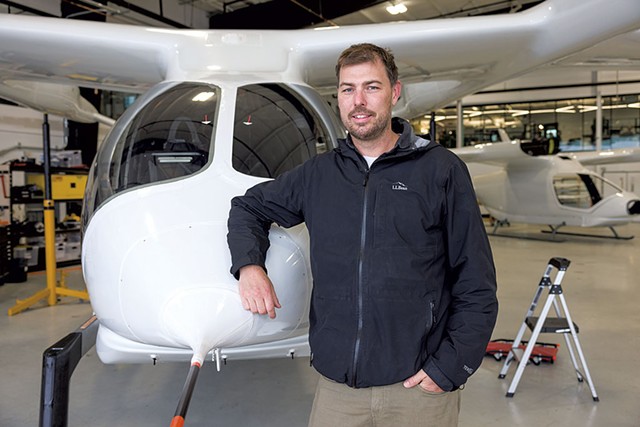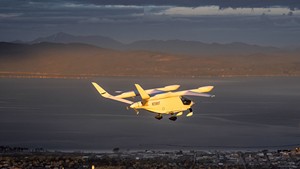
- Matt Mignanelli
In December, Beta Technologies founder Kyle Clark bought a $3.5 million estate on 130 acres in the mountain town of Lincoln, 50 minutes by car from the South Burlington headquarters of his billion-dollar electric aviation company. Clark, a Vermont native who had previously lived in Underhill with his wife and four children, is an experienced pilot, and he wanted an airstrip on his property for commuting and recreation. On March 17, before he and his family had settled into their new home, Clark went to Lincoln's zoning administrator with an application to use a 1,500-by-60-foot swath of field on his land as a private takeoff and landing zone.
He learned that his request had been approved, Clark said during a recent Lincoln Selectboard meeting, when several people showed up unannounced at his house the following weekend, anxious to know what he planned to do with an airstrip.
"We were moving in and unpacking stuff, and people were coming down the driveway to ask me what the heck was going on," he said. Clark added that he had intended to talk to his neighbors once he'd been notified of the approval, but they beat him to it: Marilyn Ganahl, who lives just north of Clark, had spread the word after finding out about his permit on the same day Clark and his family were moving in. There had been lots of speculation around town, and Ganahl had emailed the zoning administrator to get the facts.
"Nobody knew anything, because there was never any public process," she said.
On March 28, Ganahl filed an appeal, citing the town's failure to seek community input on Clark's permit application. The appeal, which will commence with a public hearing on May 9, has put the airstrip on hold until the zoning board reaches a decision.
"This isn't about Kyle or his company," Ganahl told Seven Days. "But the only way to get any kind of transparency and open discussion was if somebody filed an appeal, and I was willing to do that, because I think it's that important." The proposal, she noted, never received any public scrutiny — not even in a routine zoning board meeting. "What we're looking for," Ganahl said during the selectboard meeting, "is a fair, equitable application of regulations with a predictable process that people can count on."
Others in Lincoln seem unbothered by the prospect of a new airstrip in their midst. "Were Lincoln residents in a huff when the very first horseless buggy came to town?" one pro-airstrip commenter mused on Front Porch Forum. Another resident suggested that he would prefer Clark's electric aircraft to his neighbors' ATVs.
Harry Reynolds, a member of the zoning board, acknowledged Ganahl's complaint about the lack of public notice. "I mean, she's legitimately got a point there," he said. But the bigger picture, from his perspective, is whether Lincoln is willing to accommodate change. "To me, it's this 'not in my backyard' attitude that just isn't thinking too far in the future and isn't welcoming to the owner of a pretty innovative company wanting to live here," he said. "It's kind of an interesting story — you know, the NIMBYs versus the tech guy, or whatever."
At 1,263 feet, most of Lincoln sits in an elevated basin, a geographical formation that Ganahl likes to describe as "a Tibetan singing bowl." From the center of town, the forested slopes of the Green Mountains and their lower foothills rise steeply all around, sheltering the town in a kind of protective hug. One of the biggest items in the municipal budget is the roughly $65,000 average annual cost of sand, which the town buys in Hinesburg or Middlebury, an hour round trip by dump truck, to treat the roads in the winter. Cell service ranges from fickle to nonexistent. As Ganahl pointed out in a letter to Lincoln officials opposing the airstrip, signed by more than 20 concerned residents, it took a year of public hearings for the town to approve a single cell tower, disguised as a pine tree.
"People come here to get away from other places," said Ganahl, who tends to 11 elderly rescue horses on her 105-acre farm in the shadow of Mount Abraham. Among other things, she is deeply concerned about how even the slightest increase in air traffic might affect the local fauna.
"Just imagine: There are three pairs of nesting bobolinks in my hayfield," Ganahl said. "I don't hay until July, because I wait until the ground nesting birds have left. These bobolinks, they don't have any electric batteries, or sonar, or radio communications, or fuel source. They fly from South America, where they migrate, back up here to breed. And that's just one species. What's this going to do to them?"
Lincoln, a town of 1,300 people, is already home to two private airstrips. One is on the property of entrepreneur and helicopter pilot Martine Rothblatt, the CEO of the biotech firm that produced the first genetically modified pig heart to be successfully transplanted into a human recipient. Rothblatt, who gave Clark $1.5 million to launch Beta in 2017, plans to someday use Beta's electric aircraft to deliver lab-engineered organs to hospitals.

- File: Oliver Parini
- Kyle Clark
Applications for private airstrips and helipads have been on the rise throughout Vermont in recent years. In a February 2021 memo, state Transportation Board executive secretary John Zicconi urged towns to adopt aircraft ordinances, writing: "These private facilities can dramatically change the character of an area and can have negative impacts while providing a private benefit to few." According to the state Agency of Transportation, more than 60 private airstrips are in use across Vermont.
Ann Kensek, Lincoln's zoning administrator, concedes that the town's airstrip policies are "pretty gray." At present, she said, "there's nothing in the rules that says you can't do it, so you can." Kensek was appointed last May, the fourth person since 2020 to fill the post. Her zoning duties are theoretically part time, but since the airstrip controversy began, she's sometimes had to come into the town offices on Saturdays to catch up on her other work. The past few weeks, she said, have been enormously stressful. "I'm a very shy person," she told Seven Days, a week after Ganahl filed her appeal. "I have no attachment to any decision, one way or the other. I just want to do what needs to be done."
Critics have cited the speed with which she approved Clark's permit — five days after he submitted his application — as evidence of a slapdash review process. But she and Clark have argued otherwise.
According to Kensek, Clark first approached her in January about the possibility of a turf airstrip on his land. She researched aviation protocols and the plane Clark intended to fly well before he officially filed his request, she said.
"I got calls from the FAA, from the state; I got calls from colleagues in many different places because of Ann doing her homework," Clark said during the April 5 selectboard meeting.
In Kensek's estimation, Clark's proposal went "above and beyond'' to minimize disturbances to his neighbors. "He created this plan with a pilot's eye, and a respectful eye," she said. Clark's application stipulated that his flight path would steer clear of "equine areas," such as Ganahl's farm to his north, and that he would avoid travel between 9 p.m. and 7 a.m. Because Clark's plan called for a turf airstrip that wouldn't involve paving or construction, she saw no reason to send his application to the zoning board for review, Kensek said.
Clark told Kensek and Seven Days that he would mostly fly a Pipistrel Alpha Electro, a two-seat electric plane with a "nearly silent noise profile," as he put it. ("I don't care how quiet his plane is," Ganahl said. "It's visual pollution!")
In an email to Seven Days, Clark acknowledged that he might fly other planes, too — for instance, "if occasionally the family were to need a four-seater to go to a lake," or if he acquired newer electric models. He said he took pains to place the airstrip where it wouldn't impinge on waterways and that he intends to invite students from the local school to visit his property and learn about electric aviation.
The airstrip appeal is the second zoning-related setback Clark has faced in recent weeks. In late March, South Burlington's Development Review Board approved Beta's plan for a manufacturing facility near its main campus at Burlington International Airport, on the condition that the company first construct a building to hide a parking lot from view. But Beta's plans had called for completing the structure at a later stage; building it sooner would siphon millions of dollars away from other projects, the company told the Development Review Board.
In the wake of the DRB's decision, Gov. Phil Scott took the unusual step of calling on the City of South Burlington to waive its parking regulations or else risk losing the company to another city, such as Plattsburgh, N.Y., where Beta conducts test flights of its electric aircraft.
"This is not just about jobs for Chittenden County; this is going to have a ripple effect across the entire state," Scott told reporters during one of his weekly press conferences. "I think this is as big as when IBM decided to locate in Vermont." That day, South Burlington officials voted to reopen Beta's application and hold another hearing at the end of this month.
In Lincoln, some people have evoked the virtue of Beta's mission in their support of Clark's personal mobility preferences. "He's trying to get these 18-wheelers off the roads," said former selectboard member Ellie Bryant, who is married to Reynolds, referring to Beta's contract to supply the United Parcel Service with a fleet of electric cargo planes. "He's having zoning problems in South Burlington, and now he's battling the Town of Lincoln. Meanwhile, he's got a billion-dollar company to run. I feel bad for the guy."
Others, like 23-year-old Spencer Prescott, believe that the airstrip debate has nose-dived into negativity. He described what felt to him like an "underlying little needling" in the arguments of some opponents of Clark's airstrip, a rejection of change disguised as a love for the community.
"Lincoln is this absolutely beautiful place," said Prescott, whose family has lived in town for generations. "But I also think that there's beauty in other things, and beauty in technology. Personally, I look forward to being able to look up and see an electric plane." As a result of this public consternation, he said, he's even considering joining the zoning board.
Reynolds, the zoning board member, thinks Lincoln could use a dose of youthful energy, like Prescott's. "I'm 70, and most of the selectboard members are in their seventies," he said. "Things are changing fast, and we have to work through it. I'm just hoping we can do it in a civil way."
Ganahl, however, feels that Lincoln should not yield so readily to the advances of the modern world.
"There's an overwhelming silent majority here who want peace and quiet and privacy in a changing world that can really be rough on those concepts," she said. "Our whole ecosystem, including the airspace above us and the amazing wildlife and natural resources that we have up here, is because we're isolated, because we've been inconvenient to get to. Until now."













Comments
Comments are closed.
From 2014-2020, Seven Days allowed readers to comment on all stories posted on our website. While we've appreciated the suggestions and insights, right now Seven Days is prioritizing our core mission — producing high-quality, responsible local journalism — over moderating online debates between readers.
To criticize, correct or praise our reporting, please send us a letter to the editor or send us a tip. We’ll check it out and report the results.
Online comments may return when we have better tech tools for managing them. Thanks for reading.